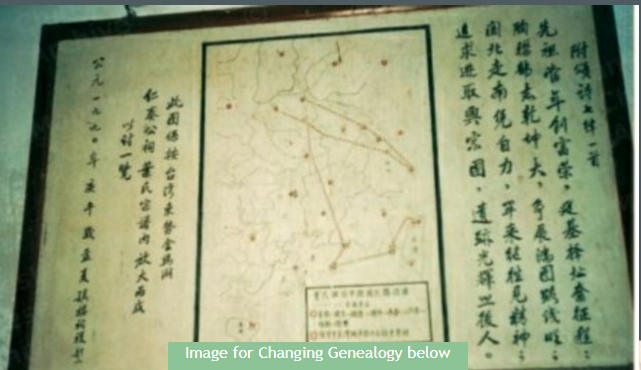Archives and Genealogy
Archives in China
An archive means many things to many different people. For many Westerners, the image of the family tree and a store of related documents conjured at the prompt of the word “archive”. Large centres house thousands of documents for research and personal interest worldwide, such as the vast National Archives of India in Delhi, with over 40 kilometres of boxed material. Such archives are preserved to provide evidence of people’s lives and communities’ evolution or devolution.
The Chinese archive has a similar purpose but a very different method. The Chinese do not traditionally keep archives as Westerners would recognise them. In China, many small villages are associated with a particular family, such as the Tang. They are associated with a particular clan or group, such as the Hakka (a large sub-
Jia Pu
Ancestry and family are revered in Chinese culture, manifesting in ancestor worship and iron-
Chinese communities were committing their genealogy to paper, scroll or stone as far back as the Pre-
Of course, not every village is solely habited by a single family, and so in some cases, you will find a Jia Pu that serves a whole village and records a few different family names. According to The Hundred Family Names (a physical record of Chinese surnames compiled in the 10th century CE, during the Song Dynasty, known as Bai Jia Xing), 438 commonly used Chinese family names exist. There are thought to be over 5,000 surnames in total, 1,000 of which are in use today. When a Jia Pu does serve a single family, it is very easily searched as it will follow a strict hierarchical order. It will start at the top with a progenitor, usually an unknown ancestor, and branch out from there. Each branch of the clan will list the head of that branch, the first, then the second, then the third, son, and then the description of each generation’s happenings and achievements, then other branches off of that branch. The end result is a highly structured, vastly detailed family tree and a source of pride for the family or village.
Confucius’ Genealogy
The oldest family history in the world is that of the Kong family, a prestigious member of which was Confucius (or Kong Zi or Zhong Ni, as he is also known in China). The Kong family can easily be traced back over 80 generations (over a thousand years) to the present day. Confucius himself is estimated to have at least two million descendants, as recorded by the Confucius Genealogy Compilation Committee, and due to the events surrounding anti-
Changing Genealogy
Events such as these often have a powerful, direct impact on what gets recorded in your genealogy. Within the last couple hundred years, people have been moving about more frequently and further away, making record keeping of your family’s history much harder. Wars, conflicts and other political changes can affect what is kept and what is destroyed or thought of as irrelevant. Something similar has had a resounding impact on Chinese genealogy. With the establishment of the People’s Republic of China, campaigns came against the “Four Olds” (ancient habits, customs, ideas and culture), of which keeping records of your genealogy was considered derivative. People were to stop talking about family trees as such a custom was seen as archaic and a throwback to feudalism. With family, trees came family legends, class delineations and titles. Communism sought to uproot all this thought and destroyed many written family trees. Their families hid those that survived. Many genealogies became lost, destroyed or halted, such as Confucius’. This policy has only been lifted recently, in the 1980s.

